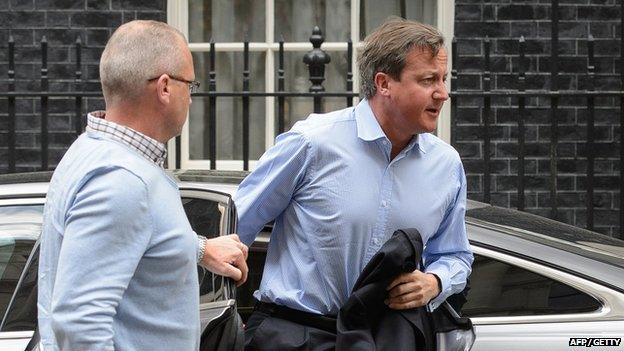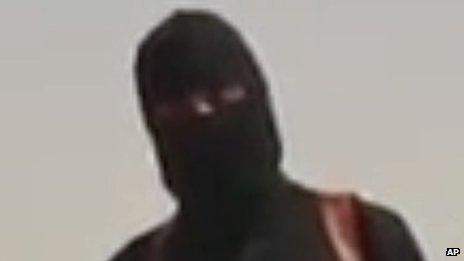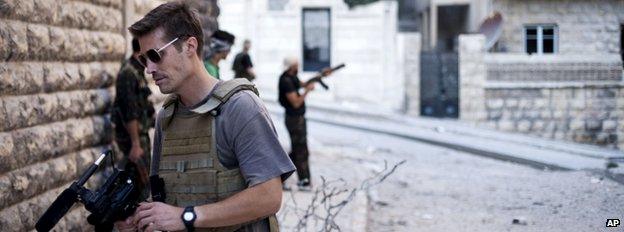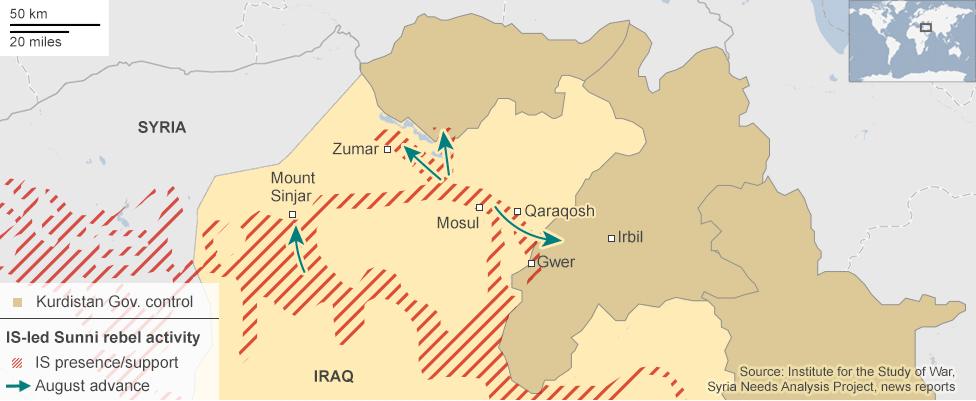James Foley beheading: Hunt on for 'British' jihadist
- Published
MI5 is helping in the search for three British jihadists, nicknamed John, Paul and Ringo, as Dominic Casciani reports
Police and security services are trying to identify a suspected British jihadist who appeared in footage of the killing of a US journalist.
Extremist group Islamic State (IS) published a video of the moments before and after James Foley was beheaded.
Unconfirmed reports suggest the man in the video - who had an English accent - is from London or south-east England and may have guarded IS captives.
Mr Foley, 40, had been missing since he was seized in Syria in 2012.
The FBI is leading the international hunt for his killer, while Scotland Yard is examining the content of the video.
Since the footage was released, American forces have carried out 14 air strikes targeting IS militants near the Mosul dam in northern Iraq.
Fighting has been continuing in the area since Iraqi and Kurdish forces recaptured the strategically important dam from IS earlier this week.
US mission
Prime Minister David Cameron said on Wednesday it looked "increasingly likely" the man thought to be involved in killing Mr Foley was British, but that it was "not a time for a knee-jerk reaction".
Mr Cameron - who broke off from his holiday temporarily on Wednesday - will continue to take calls and briefings, Downing Street said.

David Cameron returned from holiday in Cornwall to chair meetings
BBC security correspondent Frank Gardner said the man in the footage was thought to have travelled to Syria in the last three years.
The Guardian said the man was thought to be the leader of a group of British fighters based in Syria, external. The paper said he called himself "John" and was believed to be from London.
Three British jihadists guarding IS hostages in Syria are understood to have been nicknamed John, Paul and Ringo by their captives. The jihadists were collectively known as "the Beatles".
BBC world affairs correspondent Rob Watson said sources had confirmed IS had been using three British jihadists to guard foreign prisoners.
Meanwhile, officials have said the US launched an unsuccessful mission to try to free Mr Foley and other American hostages in the country.
IS fighters have been holding more than 20 foreign hostages.
'Maximum impact'
The Metropolitan Police has warned that "viewing, downloading or disseminating" the video might be an offence under terrorism laws.
Erin Saltman, senior researcher at counter-extremism think tank the Quilliam Foundation, said the video represented a "game change". She said it showed IS was now focused on the West.
"It [the video] was created using a British foreign fighter to create maximum impact so that the West could not ignore the figures that are playing out at this moment," she said.
Former MI6 director of global counter-terrorism Richard Barrett told BBC Radio 4's Today programme he believed the man holding a knife in the video would be traced, but there would be "huge problems involved" with bringing him to justice.
He added: "There are courses of action that can be taken and once he is identified then that course of action becomes a lot clearer."

The man shown in the video spoke with an English accent
The video footage of Mr Foley, titled A Message to America, shows the journalist wearing an orange jumpsuit, kneeling in desert-like terrain beside an armed man dressed in black.
The masked militant, who identifies himself as an IS member, says the journalist's death is in retaliation for US attacks on IS in Iraq.
After he speaks, the militant appears to start cutting at his captive's neck before the video fades to black.
Mr Foley's body is then seen on the ground.
Military intelligence analyst Stuart Ray told BBC Radio 4's World At One programme the terrain and way the shadows fell on the subjects in the video suggested it could have been shot near the IS stronghold of Raqqah in northern Syria.
Elizabeth McClelland, a forensic speech analyst, said the voice of the masked militant would form a "useful part of the jigsaw of evidence" investigators would be amassing.


Analysis: BBC Security Correspondent Frank Gardner
The race to identify James Foley's killer has been taking many forms.
On the databases of MI5, the UK security service, in the records of the Police Counter-Terrorism Unit and out in the digital forums and social media postings of the internet, clues are being examined and assessed.
The man in the video of the journalist's final moments is thought to have probably come from London or south-east England. He is presumed to have travelled to Syria some time during the last three years and he will be well-known to some in jihadist circles.
Unconfirmed reports say he is one of a small handful of Britons tasked with guarding Islamic State's western captives. The militant who appears in the video is careful to keep much of his face hidden but the voice on the tape is distinctive and analysts believe it is only a matter of time before he is identified.
Bringing him to justice though, will be an altogether more difficult proposition.

'Failed dismally'
It is estimated that IS, which has seized large parts of northern Iraq and Syria, has hundreds of recruits from the UK in its ranks.
Some 69 people suspected of Syria-related jihadist activities have been arrested in the UK.
The killer speaks with a British accent, as the BBC's Frank Gardner reports. Some listeners may find parts of this audio disturbing.
Sir Iqbal Sacranie, an adviser to the Muslim Council of Britain, warned of a "sub-culture of jihadi-cool" as it was described in the media, and about the ideology of militant groups which was "totally alien to Islam".
The current approach to preventing extremism had "failed dismally", he added as he called on the government and community groups to work "as a team" to tackle the issue.
UKIP leader Nigel Farage said anyone involved in fighting with extremist militants should have their passports removed and be prevented from returning to Britain.

Formed out of al-Qaeda in Iraq (AQI) in 2013, IS captured Raqqa in eastern Syria
By early 2014 it controlled Falluja in western Iraq
It has since captured broad swathes of Iraq, seizing Mosul in the north in June
The violence has displaced an estimated 1.2 million people in Iraq alone
Pursuing an extreme form of Sunni Islam, IS has persecuted non-Muslims such as Yazidis and Christians, as well as Shia Muslims, whom it regards as heretics
In July alone, IS expanded dramatically, recruiting some 6,300 new fighters largely in Raqqa, an activist monitoring group said

Islamic State activities as of 14 August
